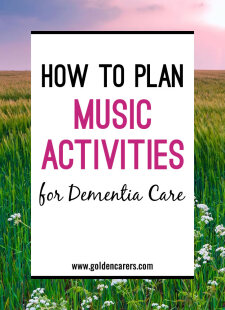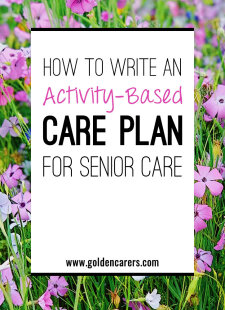Sensory Stimulation for Dementia Care

Sensory stimulation is the activation of one or more of the senses such as taste, smell, vision, hearing, and touch. Sensory stimulation enables us to engage with the environment and communicate in multiple and complex ways.
Confusion & isolation can prevent sensory stimulation
People are usually bombarded with sensory stimulation all day long to one extent or another; at home, on the street, when cooking or dancing and in many other aspects of daily living. This however is not always the case for elderly people living in long term care facilities, especially for those living with Alzheimer’s Disease. Often their overwhelming sense of fear, isolation and confusion will prevent them from experiencing sensory stimulation in their everyday lives.
Related: 20 Practical Activities for People Living with Alzheimer's
Sensory activities are key for people living with dementia
In the frustrating world of dementia and Alzheimer’s Disease, sensory stimulation is a key component for improving the quality of life of residents in long term care. Activity Programs should provide a variety of daily sensory activities to cater for different tastes.
Related: 15 Sensory Activities for Late-Stage Alzheimer's
One-on-One & Group Sensory Programs
Offering one-on-one and group sensory experiences can be challenging; you need to find the right balance so that you neither bore nor agitate residents. The aim is to keep the environment alive with sights and sounds and be mindful that unsuitable or exaggerated stimulation can cause anxiety.
Related: Tips for One-on-One Visits with Seniors
Sensory Rooms
Sensory rooms and other sensory enrichment programs are available and highly recommended but not all facilities have them. The good news is that there are a multitude of ways Recreation Professionals can assist to stimulate the senses, soothe, entertain and elicit positive emotions.
Related: Snoezelen Rooms & Sensory Environments for Dementia Care
Benefits of sensory stimulation:
- Improving cognitive symptoms and maintaining daily function.
- Encouraging participation in social groups.
- Opportunity for reflection and trips down memory lane.
- Increased concentration and alertness.
- Facilitating communication.
Sensory Stimulation Ideas

No one knows your clients better than you. Some of the activities below are suitable for people in the early stages of the illness and some to the more advanced stages. As professional Recreation staff you must make an informed decision as to which ones are suitable and appropriate to offer your clients.
Related: Dementia Activities and Sensory Activities
Smell
- Place scented flowers in residents’ rooms.
- Create a sensory garden with herbs. Plant fragrant shrubs on soil or pots: gardenia (Gardenia jasminoids), mock orange (Philadelphus Belle Etoile), winter honey suckle (Lonicera fragrantissima). Also roses, remember that the majority of roses these days don’t have scent, make sure the ones you plant are fragrant such as Angel Face (Lavender floribunda), Grimson Glory, and any old and wild roses. Don’t forget the jasmines, wisteria, Lily-of-the-valley, violets and others.
Related: How to Start a Garden Club for the Elderly - Use aromatherapy. Invest in an electric aroma diffuser; you have to shop around because they range from $40 to hundreds of dollars. The reason being they can be diffusers, vaporisers and humidifiers all at once so just buy what you can afford. Related: Aromatherapy Recipes
- Apply fragrance-free hand creams (fragrances are the most common allergens found in skincare products). Unscented hand lotion is not necessarily fragrance-free so stick to fragrance-free. There will still be a pleasant smell in fragrance-free hand creams.
- Facilitate delicious food smells to alert the senses, for instance, the smell of coffee brewing and cooking pancakes and bread.
- Small jars filled with fresh herbs such as lemon balm, Rosemary, and Basil on dining tables may stimulate appetite.
- Play games such as Guess the Smell: make sachets of cinnamon, cloves, thyme, basil, and others.
Related: Scent Guessing Game
Taste
- Introduce residents to new tastes: Have a ‘Multicultural Day’ occasionally and ask staff and residents’ relatives to bring typical food from their countries for tasting.
Related: Multicultural Day Ideas for Nursing Homes - Offer old fashioned desserts such as Hummingbird Cake, Pound Cake, Bread & Butter pudding, Lamingtons, Peach Cobbler, and others.
Related: Cooking Activities - Make a quiz game out of foods that are salty, sweet, sour and bitter. Ask questions:
- Favourite salty/sweet, bitter, sour food.
- Food I think is overrated
- Food I would like to try
- Food I will never try
- Food everybody likes and I don’t
Sounds
- Facilitate listening to the sounds of nature, poems, and religious services according to choices of each individual.
Related: 10 Spiritual Activities for People Living with Alzheimer's Disease - Offer different music experiences such as: Folk, Brass, Classic, Nursery Rhymes, Church bells, Arab drums. (When offering music make sure it is not too loud and that it is not disturbing peers). Related: Sensory Stimulation with Wind Chimes
- Show DVDs of1950 – 1960 famous singers: Nana Mouskouri, The Seekers, Richard Clayderman, Elvis Presley, Bob Dylan and many others.
- Read poems, proverbs, limericks, tongue twisters and rhymed nursery rhymes.
- Provide one-on-one assistance with games, quizzes, reminiscing.
Related: Reminiscing Activities for Seniors
Touch
- Massage hands and feet with essential oil mixture.
Related: Hand Massage & Nail Care - Hold special ‘Beauty Therapy’ days to groom hair, nails and offer facial masks.
Related: Beauty Therapy Activity - Invest in a spa bath.
- Play pairing and matching games
Related: Pairing & Sorting Game - A ‘Sensory Box’ or ‘Trinket Box’ is a box filled with personalized items precious to each individual. With the help of family make boxes with: knick-knacks, holiday’s photos, an old driver’s license, favourite perfume, awards, favourite book, religious mementos, and anything else dear to the person.
Related: Sensory Boxes & Other Ideas to Stimulate the Senses - Offer home-like activities: cooking, washing/folding clothes, washing dishes.
Related: Daily Living Activities - Facilitate pets to come for visits. Establish that each individual enjoys pets before visits.
Related: Pet Therapy in Nursing Homes - Have a box of ten to twelve pieces of fabric in various textures for touch, feel & reminisce (sized 15 x 15 inches or 40 x 40cm).
- Offer outdoor activities in the early morning sun (between 9 and 10:30 am) for Vitamin D absorption. (Use sunscreen and hats for sensitive skins).
Related: Sunshine & Song - Remember that touch is a good communication tool; holding hands, a hug or a gentle shoulder massage is particularly good to alert the senses.
Sight
- Offer DVDs depicting nature, landscapes, people, cities, and monuments. Armchair Travel, David Attenborough nature series. (Watch the shows first, some animal DVD can contain disturbing footage).
Related: Armchair Travel: A Meaningful Sensory Activity - People confined to bed may have colorful mobiles (age appropriate) hanging from the ceiling
15 Uplifting Activities for People Confined to Bed - Decorate the facility with flowers and foliage (banana leaves, Bird of Paradise flowers and leaves).
- Organize a visit to your local Botanical Garden in autumn or spring. The flower scents, sound of birds, and the fresh air all combined offer a pleasant experience and positive stimulation for the senses.
- Windows in bedrooms should have a nice view. Either a decoration or a plant or foliage.
- Decorate recreation area with colors considered calming (green, pink, and blue).
Consider Theme Kits
Theme Boxes contain items relating to a particular theme.
- The seasons; spring, summer, autumn and winter.
- Sea & Beach theme.
- Bride and Groom.
- Valentine’s Day
- Christmas theme
- Going Fishing
- Going Camping
- Tool Box
We'd love to hear your feedback!
What sensory stimulation activities have you found to work well with people living with dementia?






I am a potter and have volinteered to do some pottery with the residents. We are first making a bird by manipulating the clay into shape. (You need fairly soft clay). The next week they are to paint the pieces. While the pieces are still leather hard I will inser a nichrome wire u shape into the clay. This can be made into a hanging decoration.
I live in deforest wisconsin and my aunt works at a retirement center for people who have dementia and I have been looking for crafts and activities that I can do with them because that is my job of u find any other ones please let me no
Hi Patrice, 'Reject shop' is a variety store chain selling at low prices 'seconds' from factories, print shops, leather goods scrap, and many more items suitable for craft. Best wishes.
Hi do you know if there is a similar shop available in the uk ?
Is there a place online where you can purchase items or is it a store close to you.
You can get small bubble wands from Reject shop that have bubbles that don't burst so the residents can hold them in their hand.
May I ask...what is a Reject Shop?
I'm still just a homecare person, hope to be a RAO one day, just need build up my confidence.. I would like to volunteer somewhere on my day off to assist a RAO one day a week to gain practical exp.
Hello, my name is Belinda and I am looking at ways to incorporate residents who are cognitively impaired and can no longer join in activities apart from sensory and aromatherapy. Our OT has asked us to come up with some ideas so these people can have groups that just they can attend and get the most out of. All ideas will be grately appreciated
Please be aware when having bubbles inside,of falls risks as burst bubbles on floor may create slippery surface. Great outside in spring sunshine!
I already have some of the items and surely will add the herbs.
Thank you
I have been searching for a good while for a sensory activity, this looks fantastic, we will be organising this activity next week.
Patsy 29/7/2014
Can't wait to organise the sensory activity and bubbles = Thank you Shirley NSW
I am trying my first sensory day tomorrow we can not use food for them to taste so I gathered and bagged materials from the Kitchen ( sponge , towel , wipes , paper towel etc) a bag of bathroom things . Everyday materials like silk, cotton wool, felt . A bag of small plastic , wood , stone , marble pieces for a what is it made of quiz and a bag of smells like mixed herbs , desecrated coconut , salt ( but not pepper lol ) . I am hoping our visually impaired residents will come along and have a bit of fun , fingers crossed it goes well and they enjoy the session I also hope its not to basic for them or they will certainly let me know, ;)
Great idea Jacqueline. I will give bubbles a go.
One of the things I use for sensory stimulation is bubbles lots of fun but good for eye movement and getting the residents to blow the bubbles is good for the lungs (inhale exhale). the ones you can get at National geographic are the best as they don't pop as quick.